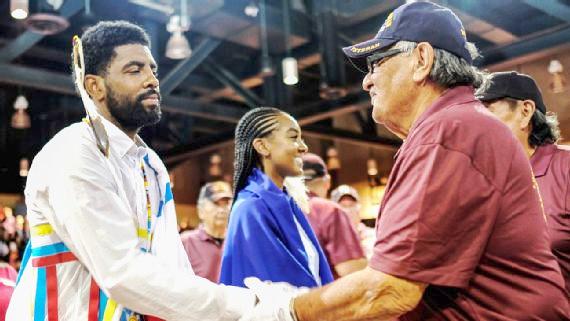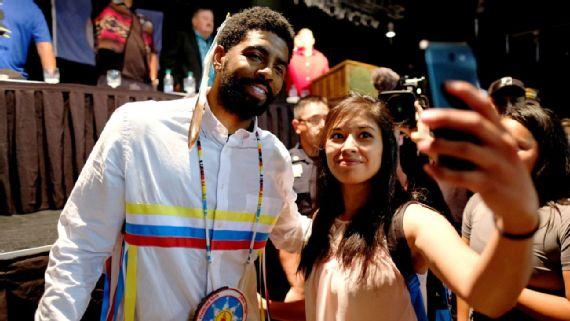 |
Canku Ota
|
 |
|
(Many Paths)
|
||
|
An Online Newsletter
Celebrating Native America
|
||
|
DECemBER 2020 - Volume
18 Number 12
|
||
|
|
||
|
Kyrie Irving Finds
New Name And New Family On North Dakota Reservation
|
||
|
by Brian Windhorst -
ESPN Senior Writer
|
||
CANNON BALL, N.D. -- The Standing Rock Sioux Reservation stretches across the central Dakotas, a harsh and largely desolate landscape along a wide section of the Missouri River. It is not an easy place to live and not an easy place to get to. But it is a sacred place for the Sioux, they've defended it for hundreds of years. It is the land of Sitting Bull. They defend it to this day, the most recent opponent being intruding and, the Sioux fervently believe, dangerous oil pipelines. And they defend their way of life, their Lakota traditions and language. This is not a place for empty gestures or for public-relations stunts. It is authentic as it gets, in charming and foreboding ways. Kyrie Irving came to Standing Rock this week for the first time. He did not come for charity -- he gave the tribe $100,000 a year ago -- and he did not come for photo ops. The main event was sternly off limits to video or photography. He came to honor his mother and he came to understand his heritage. Irving didn't know his mother, Elizabeth, well. His parents separated when he was very young and she moved across the country before she passed away when Irving was just 4 years old. He has both mourned her and been inspired by her for much of his life. As he grew, sometimes he had to fill out paperwork that asked for her information. He'd get emotional sometimes having to leave it blank. When he got his signature shoe from Nike, the first model he wore had his mom's name and the date 9-9-96, the day she died, stitched into them.
For the past few years, Irving has been searching for himself a little. It's shown in some of his actions and some of his words. One of the most material ways was reaching and connecting to the Standing Rock Sioux, the tribe his mother was born into before she was adopted. It reached a new depth when he was honored with a naming ceremony this week, a watershed moment in any Lakota's life. He was given the name Little Mountain -- "Hela" in the Lakota language -- as part of his family tradition; his roots are from the White Mountain family of the South Dakota region of the reservation. "There was a certain point in my life where I had come almost at a crossroads with my dad, my sister, my friends, my grandparents, and I had no idea kind of what direction to go into because I had lost the sense of a foundation," Irving said. "Knowing my mom passed and left me such a powerful, empowering family such as Standing Rock ... to be a part of it now, this is family for life." Irving completely embraced the experience, dressing in traditional clothing and taking part in a more than five-hour ceremony that included numerous speeches, drumming, chanting, praying and dancing.
Irving is one of the most popular athletes in the country. He has a huge contract and big shoe deal. He just had a reasonably successful wide-release movie in which he was the star. He did not need to come to Standing Rock. He didn't need to tweet about their struggle to stop pipelines two years ago. He didn't need to sign hundreds of autographs or take selfies or stay past his allotted time to shake the hands of hundreds in the crowd so they could all leave saying they met Kyrie Irving. He did it because he wanted to. Members of the tribe found it almost unbelievable that any of it was happening, a basketball superstar like Irving visiting the reservation alone and then giving the community a collective hug as a returning family member. "I'm astonished by this," said Hunter Bear Ribs, an 18-year-old basketball player who lives in the Bear Soldier District of the reservation in South Dakota, the area where Irving's family is from. "This is something we're going to be talking about for a long time." Basketball is the most popular sport on the reservation and has been for generations. There are deep rivalries between the small high schools across the vast expanse. They feed an array of small college teams in the region. "Run and gun, let's get it going. That's the nature of reservation basketball," said Russell Young Bird, the athletic director and girls basketball coach at Standing Rock High School. "When it comes to basketball here, emotions are high. With this happening with Kyrie, that has taken everything to another level. It's surreal." Earlier this year, Nike put out a version of Irving's shoe that had the Standing Rock logo on the back and tongue. It was part of a special Nike line of shoes that honor and support Native American and Aboriginal people across the world. For the kids in Standing Rock, the concept of them being able to buy a basketball shoe with their tribal logo was beyond their imagination.
Especially since before Christmas 2016, when Irving revealed in an interview with ESPN's Rachel Nichols that he was part Standing Rock Sioux, few with the tribe had any clue of the relation or Irving's awareness of it. Nichols' head snapped back in the discussion when Irving told her, and that emotional reaction was exponential on the reservation, where the tribal leaders were equally as unaware. Some of Irving's family were aware of Kyrie and his sister. But they weren't sure Irving knew of his mother's roots. "I mean this came out of nowhere, it's crazy to us," said Bear Ribs, who attends McLaughlin High School, where Irving likely would've gone had he been born into his family on the reservation. "I ordered a pair of the shoes like the third day after they came out." Irving's story hits home for many in the tribe. Not just because he becomes a role model for those who dream of doing big things, but also on a more personal level. Many young Sioux can relate to Irving in a more melancholy manner, because they didn't know their parents. "We have a lot of drugs and alcohol problems here and there are a lot of kids who aren't raised by their parents. There's a lot of grandparents who have taken over," Young Bird said. "This sheds light on things for kids. And it shows them they can set their goals high because Kyrie did and he is like them." Those problems have touched Irving's family and contributed to the reasons his mother was given up for adoption when she was born in 1967. Those who follow the Boston Celtics star know he's a complicated figure, a creative offensive genius and a free thinker who isn't afraid to show his independent spirit. His complex family background may help explain it. "I lost my mom at a very young age and I had no idea, no idea that I would end up belonging to almost four different families," Irving said. "I'm finally meeting my mom's family." His father, Dred, was raised in the Bronx projects and encouraged Irving to learn how to play on its basketball blacktop. His mother was half Sioux, adopted out of the tribe and into a family of Lutheran minsters, George and Norma Larson, who live in Seattle. Irving also has his own family, a 2-year old daughter named Azurie. The fourth wing of the family is the one Irving was getting to know this week. He took a long flight from the West Coast to the nearest airport in Bismarck, which was 50 miles from the Prairie Knights Casino, a speck of a place on the Plains that's operated by the Standing Rock Sioux. There he met dozens of family members including his aunt, who'd flown in from Florida to see him. The story of Irving's aunt, Kelly Brinkley, underscores just how unusual Irving's family situation is. Brinkley learned her late sister left two children more than a decade ago. She never knew her sister and didn't know she had children until some paperwork arrived from the tribe informing her. When she looked at the names, she was struck that in 1992 her sister had a child and named him Kyrie. Four months earlier that year, Brinkley had a daughter and named her ... Kyrie. She shared the story of when she finally met Irving, years later, this week in North Dakota. "It gave me joy knowing that my sister Elizabeth and I apparently thought a little bit alike," Brinkley said. "I hoped then that someday that (the cousins) would be part of our big, beautiful culture." Whether or not Irving's journey this week closed the circle is to be seen. He smiled throughout his time on the reservation, embracing distant relatives, posing for photos and accepting gifts ranging from T-shirts and blankets to a painted bull skull. As the ceremony wrapped up, Irving asked organizers from the tribe if he could shake everyone's hand before he left. A massive line formed and Irving stood, saying hello to the hundreds who had come. Teenagers wearing Celtics jerseys, Cavs jerseys and traditional clothing moved through the line with anticipation. Adults laughed as if they were children. Everyone was happy. None of them could believe it, none of them would forget it. That included Irving. "Blood couldn't make us any closer, and our journeys have been directed in so many different ways, but yet we are still standing here," Irving told the crowd. "It shows how special and what it means to be a native of this country, and to be Native American." |
|||||
|
|
|
|
||
|
|
||
| Canku Ota is a free Newsletter celebrating Native America, its traditions and accomplishments . We do not provide subscriber or visitor names to anyone. Some articles presented in Canku Ota may contain copyright material. We have received appropriate permissions for republishing any articles. Material appearing here is distributed without profit or monetary gain to those who have expressed an interest. This is in accordance with Title 17 U.S.C. Section 107. | ||
|
Canku Ota is a copyright ©
2000 - 2020 of Vicki Williams Barry and Paul Barry.
|
||
 |
 |
|
|
The "Canku
Ota - A Newsletter Celebrating Native America" web site and
its design is the
|
||
|
Copyright ©
1999 - 2020 of Paul C. Barry.
|
||
|
All Rights Reserved.
|
||

